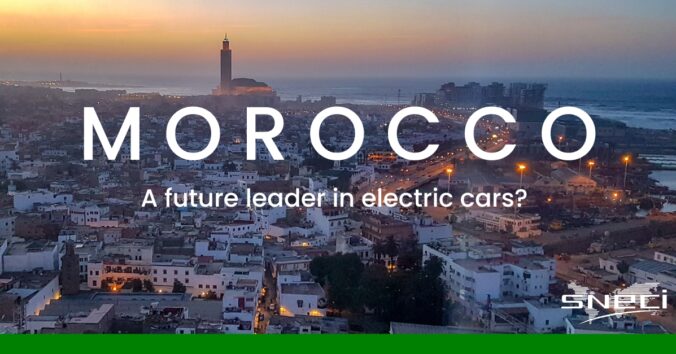Morocco: A Rising Star in the Electric Car Industry

Morocco: A promising country for electric cars.
Indeed, Morocco is positioning itself as a major player in the electric car industry. The country already has a production capacity of 40,000 electric cars per year. It aims to increase it to 100,000 by 2025, according to the Moroccan Minister of Trade and Industry.
Today, Morocco is a dynamic player in the automobile industry. It has several assets which favor an inevitable success in this sector, such as its strategic geographical position allowing it to easily serve European markets.
Assets of Morocco in the electric car sector
Also, this North African country has strong potential in renewable energies, offering low-cost electricity production for electric vehicles. Precisely, thanks to its exceptional sunshine and its exposure to strong and regular winds, Morocco has a real advantage in terms of wind and solar energy production. This allows it to strengthen its energy mix and reduce its dependence on fossil fuels.
Furthermore, Morocco employs more than 230,000 people in the automotive sector with a qualified workforce. This workforce is made up of highly skilled technicians, engineers, and workers who are trained and produce high-quality vehicles. The country is planning to train even more professionals to boost its ambition of becoming a key player in the electric car market. Adequate training courses, whether specialized in robotics, IT, or even quality management, are provided by schools and companies in the automotive sector.
To go even further in its strategy, Morocco is making investments in its existing factories but also in new industrial zones specializing in the production of electric batteries. Morocco has already signed agreements with foreign companies for the construction of electric battery gigafactories on its soil. Morocco is now engaged in a global race to welcome factories to support its automobile industry among an electric transition. To attract more Foreign Direct Investment (FDI) in the electric vehicle supply chain, the North African kingdom highlights its competitive advantages, its political stability, its lower operating costs, the presence of large automobile manufacturers, their suppliers, and the availability of cheap renewable energy. These factories will allow Morocco to produce batteries at competitive costs but also to create jobs.
Challenges of Morocco in the electric car sector
To achieve its objective of becoming a leader and increasing demand for electric cars, Morocco must meet several challenges. The first one starts with raising public awareness of the advantages of electric cars. Indeed, it is a relatively new technology, and there are still a certain number of obstacles to its adoption.
The Moroccan government has already taken steps to make the benefits known to the general public. Indeed, it launched a national communication campaign focused on the environmental impact but also on low maintenance costs. It has also put in place attractive tax incentives for the purchase of electric vehicles.
Another major challenge that Morocco must overcome to succeed in the electric car sector is the development of its charging infrastructure. The country currently has around 1,000 charging stations, most of which are located in major cities. Morocco has announced the installation of 2,500 new charging stations by 2026. This initiative is supported by Apime, the intersectoral professional association for electric mobility.
The charging stations will be installed in major Moroccan cities, including Tanger, Rabat, and Casablanca. They will be distributed in such a way as to cover the needs of electric vehicle drivers, both in terms of number and location. Establishing this charging infrastructure will transform the urban landscape of large Moroccan cities. It will help make electric vehicles more accessible and encourage their adoption by the general public.
Conclusion
Morocco is positioning itself as an important player in electric cars.
The country has several assets for success, including:
- its strategic geographic position,
- its access to renewable energy resources,
- its qualified workforce.
The Moroccan government is responding and has taken concrete measures to support the development of the sector, in particular by training professionals and investing in R&D.
Guided by its will and its ambition, Morocco is transforming into a major industrial hub for the automobile sector. Thus, the country is well-positioned to benefit from the growth in global demand for electric vehicles.





